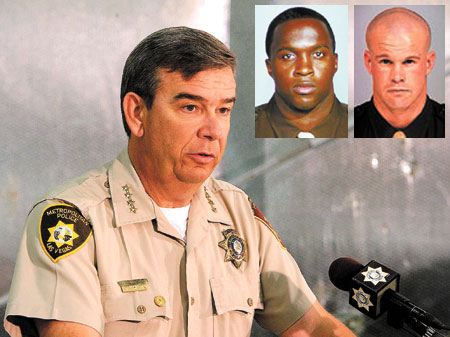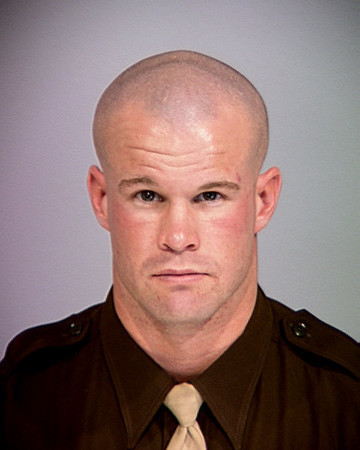Sheriff says crash that killed officer was preventable
For the second time in five months, Sheriff Doug Gillespie convened reporters to disclose that an on-duty officer was not wearing a seat belt or using lights and sirens when his speeding car crashed, claiming his life.
At a Tuesday morning news conference, Gillespie said he regrets that two of his officers now have died in accidents that were predictable and preventable.
He said that he would be instructing supervisors to discipline officers who fail to wear their seat belts and that the department would continue to review driving policies that began after the first fatal accident in May.
"I would much rather hold our officers accountable by issuing citations or discipline for not wearing his or her seat belt, or for driving carelessly, than to plan another funeral," Gillespie said.
On Oct. 7, 30-year-old officer Milburn "Millie" Beitel was killed in a crash on Nellis Boulevard near Washington Avenue. Beitel was at the wheel of the patrol car, driving 71 mph in the 45 mph zone, Gillespie said.
Exactly five months earlier, on May 7, officer James Manor died after plowing his patrol car into a pickup attempting to make a turn on Flamingo Road.
Police said Beitel swerved to avoid a vehicle making a left turn onto eastbound Washington from southbound Nellis.
Witnesses saw the vehicle turn "in front of" the patrol car, police said. The cruiser went into a skid, then hit a tree and a pole before it overturned and rested on its roof in the right northbound lane of Nellis.
The driver of the second car has not been found. Gillespie said police are hoping to talk to the driver, who would not face charges in connection with the incident.
Police spokesman Bill Cassell said both Beitel and the unknown driver had green lights, but witnesses told police Beitel had the right of way. The other driver had a "permissive green light," which requires a driver to yield to oncoming traffic if it is unsafe to turn.
Beitel was thrown from the vehicle. His passenger, 25-year-old officer David Nesheiwat, survived the crash. He too was not wearing a seat belt, Gillespie said.
Gillespie said Nesheiwat's condition is improving, but his recovery will be a long one. He spoke with Nesheiwat on Saturday, and investigators spoke with him Monday. Gillespie said that Nesheiwat's recollection of the event is foggy and that the department does not know where Beitel and Nesheiwat were headed immediately before the collision.
"Officer Nesheiwat is not able at this point in time to recall those facts," Gillespie said. "We may never know."
Shortly before the collision, Beitel and Nesheiwat investigated a call of a suspicious chemical odor on the 5200 block of East Bonanza Road. Nesheiwat, who was taken to University Medical Center in critical condition after the accident, is now at a rehabilitation center.
According to department policy, police are required to wear seat belts while in their patrol vehicles. But Gillespie said they don't always do so.
To correct that, Gillespie said he and Undersheriff Rod Jett will hold meetings with sergeants and lieutenants to make clear that officers in department-issued cars must wear seat belts. That message is expected to be passed down. Gillespie said supervisors will discipline officers or write citations when they don't wear seat belts.
But Police Protective Association union President Chris Collins said he doesn't view the fact that some officers do not wear seat belts as a problem.
Though the policy is in the books, he said, it has not been enforced.
"I never wore a seat belt in my career," said Collins, who worked as a patrol officer for six years in the 1990s. "I was never asked to wear a seat belt."
He added that wearing a seat belt can be cumbersome for officers and slow them down. He said patrol officers typically have several items on their belts while on duty: a handgun, Taser, flashlight, radio, two magazines for the gun and handcuffs.
He said the decision to buckle up shouldn't be mandated.
"I'd leave it up to the officers," he said.
Similarities exist between this month's crash and the one that killed Manor.
Manor was driving 109 mph on Flamingo, where the posted speed limit was 45 mph. Police said Manor was still driving 90 mph when he plowed into a pickup driven by 45-year-old Calvin Darling, who was making a left turn. Manor was not wearing a seat belt.
Darling was arrested on charges of driving under the influence and failing to yield to an emergency vehicle. The charges were not pursued after the police investigation determined that neither Manor nor a second patrol officer responding to a domestic violence call had their emergency lights on.
Police said Darling's blood-alcohol level tested at 0.035 percent, well under the legal limit of 0.08.
Las Vegas police have been reviewing driving policies since Manor's death. They've spoken with Dallas and Illinois State police about their respective new policies.
Dallas revamped its policy last October after one of its officers struck and killed a 10-year-old boy on a dark road. The officer, who was responding to a report of a man with a gun, was driving at least 29 mph over the 40 mph limit.
The agency's new policy generally prohibits officers from driving more than 20 mph over the speed limit on major roads and highways, even with lights and sirens on.
Illinois State Police changed its policy in November, one year after one of its troopers crossed the median on an interstate and crashed into an oncoming car, killing two teenage sisters.
The trooper was traveling 126 mph. The state police's new policy created a four-tier system for how officers respond to calls, including how fast they can drive and when they can use lights and sirens.
Under the Metropolitan Police Department's policy, officers can drive with lights and sirens, called Code 3, in four instances, including a felony in progress, an officer who needs help in a volatile situation and a call in which a citizen's life is in danger.
If a patrol car is not responding to a Code 3, the officer is required to use due care and observe traffic laws, including speed limits.
Cassell said the driving policy review is ongoing, and there is no set date for its completion.
Gillespie emphasized on Tuesday that Beitel and Manor were good cops, but that officers are human and make mistakes.
Gillespie said changing the behavior of some officers who don't wear seat belts and who speed is not going to be easy.
"Changing policy as well as culture is a process," he said. "It takes time to do it right."
Contact reporter Antonio Planas at aplanas@reviewjournal.com or 702-383-4638.
video of press conference



































